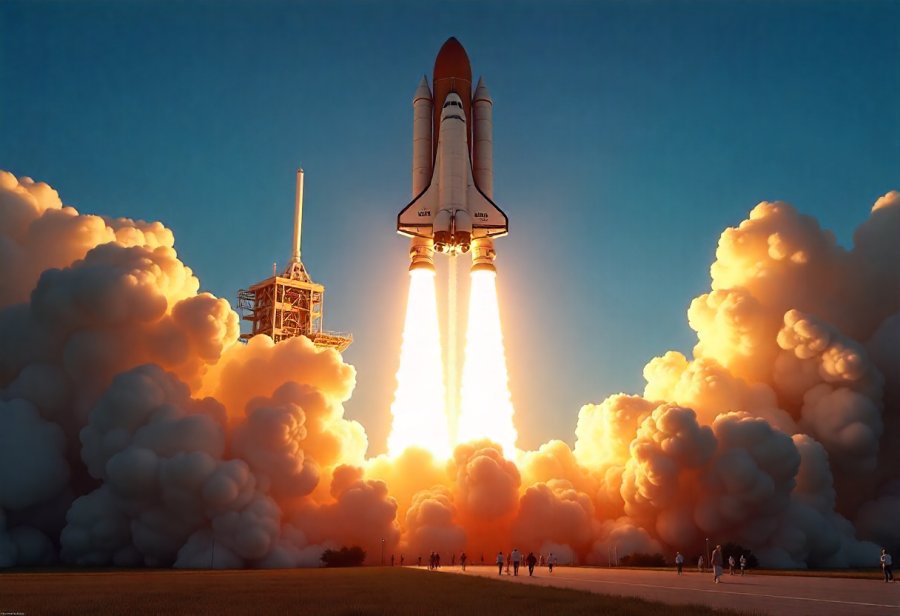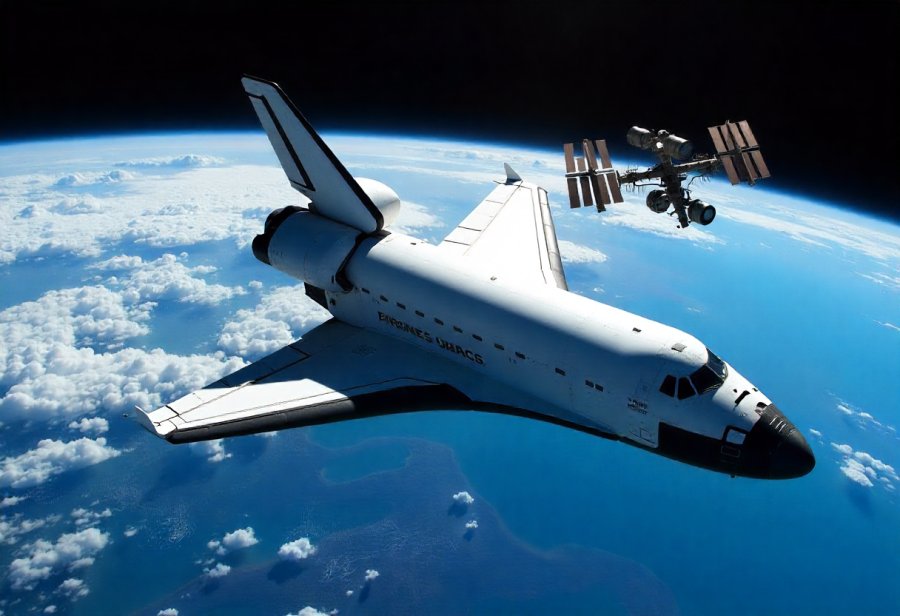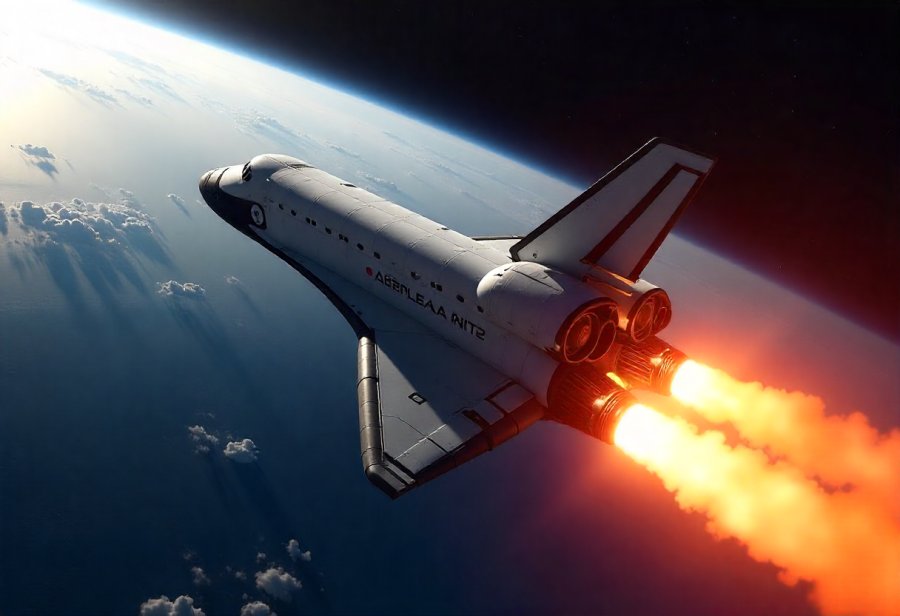In 2011, NASA’s Space Shuttle Atlantis completed its historic final mission, symbolizing both the end of an era and a new chapter in space exploration. This iconic launch not only demonstrated the shuttle’s decades-long legacy of technological innovation, international collaboration, and resilience but also underscored the transition toward new exploration frontiers—like lunar bases and Mars missions. As Atlantis delivered vital supplies and scientific equipment to the International Space Station, it reinforced the importance of shared human effort and technological progress. Its legacy, built on adaptability and global partnerships, continues to influence future missions, pushing the boundaries of safety, efficiency, and international cooperation. But what lessons from Atlantis’s storied career will guide humanity’s next giant leap into the cosmos? This final voyage remains a powerful reminder: our collective ingenuity and perseverance are the keys to unlocking the universe’s greatest mysteries—if we dare to dream and work together.

Celebrating the Last Flight of Atlantis: Humanity’s Pioneering Spirit Ignites New Horizons
In 2011, the Space Shuttle Atlantis made its final journey into space, marking a milestone that resonated around the world. After nearly 30 years of pioneering human spaceflight, this mission was more than just a routine launch; it signified the end of an era for NASA’s shuttle program and opened the door to new possibilities in exploration. Watching Atlantis lift off from Kennedy Space Center, viewers felt a mixture of pride, nostalgia, and anticipation for what would come next in humanity’s quest to explore the cosmos.
The primary purpose of Atlantis’s last flight was to deliver essential supplies, scientific equipment, and large payloads to the International Space Station. These cargo missions supported ongoing research and ensured the station’s continued operation as a hub of international collaboration and scientific discovery. The shuttle’s ability to carry bulky cargo and perform complex operations in orbit had been honed over decades, making this final mission a demonstration of its enduring capabilities.
Beyond its practical objectives, the launch carried deep symbolic significance. Atlantis’s career, which spanned 33 missions, played a crucial role in building and maintaining the ISS, deploying satellites, and servicing the Hubble Space Telescope. Its final flight marked the closing chapter of the shuttle era—an era characterized by technological innovation, resilience, and international partnership. This moment inspired millions and prompted reflection on the progress made and the road ahead.
The global reaction to the shuttle’s last flight was one of admiration and reflection. Countries worldwide recognized Atlantis’s contribution to humanity’s understanding of space and its role in fostering international cooperation. The mission also signaled a strategic shift for NASA, moving away from reliance on the shuttle and toward partnerships with commercial space companies and international partners, setting the stage for future exploration efforts beyond low Earth orbit.
Legacy of Atlantis: Paving the Path for Future Space Frontiers
The final flight of Atlantis in 2011 left a profound mark on the future of human space exploration. It proved that international cooperation remains a powerful force, as the shuttle’s missions supported the construction and ongoing maintenance of the International Space Station. This collaborative spirit, uniting NASA, Roscosmos, ESA, JAXA, and other partners, set a precedent for how countries can work together to achieve shared space goals. The success of these joint efforts fostered trust and demonstrated that collective effort drives progress beyond Earth’s atmosphere.
Atlantis’s career also highlights NASA’s ability to adapt in a rapidly changing exploration landscape. Over nearly three decades, the shuttle pushed technological boundaries—from deploying vital satellites to servicing the Hubble Space Telescope—each mission offering lessons that continue to influence future programs. These technological strides laid the groundwork for innovations in spacecraft safety, reliability, and efficiency that are now standard in newer exploration vehicles.
The legacy of Atlantis extends into the realm of logistics and operational expertise. Its capacity to carry large payloads, including station modules and scientific equipment, underscored the importance of meticulous planning and execution. These operational lessons have become foundational as private companies increasingly take on space logistics roles. The experience gained has led to more streamlined processes, safer cargo handling, and better preparedness for the complexities of sustained human presence in space.
Technological advancements from Atlantis’s missions, such as improved heat shields and precise docking systems, have elevated safety standards for subsequent spacecraft. These innovations ensure that future missions, especially those venturing farther into the solar system, are equipped to handle harsher environments and longer durations. The progress achieved during Atlantis’s extensive service underscores the importance of continuous evolution in space technology.
Beyond hardware and logistics, Atlantis’s story underscores the importance of resilience and innovation. Each mission built upon the last, demonstrating that perseverance and technological ingenuity are essential for overcoming unforeseen challenges. This mindset of continual improvement has become a core principle guiding NASA’s current and future exploration efforts, from lunar bases to Mars missions.
The shuttle’s legacy also reminds us that international collaboration is fundamental to ambitious space endeavors. The partnerships formed during Atlantis’s missions fostered a culture of shared purpose and mutual investment. This cooperative model not only advanced scientific goals but also built bridges across nations, setting a standard for future multinational projects like lunar exploration and deep-space missions.
Looking ahead, the lessons from Atlantis’s journey continue to shape exploration strategies. Their emphasis on safety, technological progress, and global teamwork remains central as humanity pushes beyond low Earth orbit. Each new mission builds on this foundation, aiming for sustainable, innovative, and collaborative exploration that extends our reach into the cosmos.
Ultimately, Atlantis’s final flight encapsulates a legacy of resilience, progress, and international unity. Its achievements remind us that space exploration is a collective human effort, driven by curiosity and a shared desire to discover. As we prepare for the next chapters—returning to the Moon, reaching Mars, and beyond—the principles cultivated during Atlantis’s career will continue to inspire and guide us in turning bold ambitions into reality.

Core Themes of Resilience and Innovation Shaping Space Exploration
Atlantis’s final flight captures some of the most enduring themes in human space exploration. It exemplifies resilience—an unwavering commitment to overcoming technical challenges and pushing boundaries despite setbacks. The shuttle’s ability to adapt through upgrades and innovations reflects a mindset dedicated to continuous improvement, ensuring safety and operational excellence over decades of service.
Innovation is woven into every aspect of Atlantis’s story. From thermal protection tiles to precise docking systems, each advancement contributed to safer, more efficient missions. These technological strides not only extended the shuttle’s lifespan but also set the stage for future spacecraft, illustrating how building on past lessons fuels progress and breakthrough solutions.
International collaboration stands out as a core element of Atlantis’s legacy. Its role in constructing and maintaining the International Space Station proved that space exploration is a collective effort. Partnerships with agencies across the globe fostered trust, shared expertise, and a common purpose, demonstrating that global teamwork unlocks the full potential of space missions.
The broader significance of Atlantis’s journey lies in its ability to inspire future generations. Its story reminds us that exploration isn’t just about discovering new worlds but about testing human limits, fostering unity, and driving technological innovation. These principles continue to shape the way we approach ambitious projects, from lunar bases to Mars exploration.
Looking ahead, the themes embodied by Atlantis’s final flight remain highly relevant. The resilience, technological ingenuity, and international spirit it exemplified are guiding principles for upcoming missions. As humanity ventures further into the cosmos, the lessons from Atlantis serve as a blueprint for overcoming obstacles and turning bold visions into reality.
Finally, Atlantis’s story underscores the importance of perseverance and cooperation in the quest for discovery. Its legacy demonstrates that progress depends on pushing through challenges with ingenuity and working together across borders. These values will continue to propel us toward new horizons, ensuring that the spirit of exploration endures long into the future.
As we look to the future, it is inspiring to consider how ongoing advancements in space technology continue to build upon the legacy of Atlantis. For those interested in exploring the latest developments and how they shape our journey beyond Earth, learning more about space exploration offers valuable insights into the ongoing quest for discovery.
Bridging the Past and Future: Practical Insights and Global Impact of Atlantis’s Mission
The legacy of Atlantis’s final mission continues to shape current and future space exploration efforts in meaningful ways. Its success in supporting the International Space Station underscored the importance of international cooperation and reliable logistics for maintaining a sustainable human presence in orbit. Delivering vital modules, solar arrays, and supplies not only expanded the station’s capabilities but also reinforced a spirit of shared achievement among participating nations. These collaborations laid a foundation for future projects, demonstrating that collective effort and mutual investment are essential for pushing the boundaries of human exploration.
Technological advancements from Atlantis’s missions have set new safety and efficiency standards for spacecraft. Upgrades like improved heat shields and precise docking systems increased resilience and operational reliability, ensuring crews and hardware can withstand harsher environments and longer missions. These innovations now inform the design of newer spacecraft, helping to pave the way for missions beyond low Earth orbit, including lunar bases and Mars exploration. The progress made during Atlantis’s nearly three-decade career underscores the importance of continuous innovation and adaptation in tackling space’s evolving challenges.
Operational lessons from managing large cargo and crew missions remain highly relevant today. Atlantis’s ability to carry substantial payloads, including scientific experiments and station modules, demonstrated the critical role of meticulous planning and execution. These lessons are guiding current efforts to develop more flexible, scalable supply chains, especially as private companies take on larger roles in space logistics. The experience gained has improved safety protocols and streamlined processes, making space missions more efficient and better prepared to sustain long-term human presence beyond Earth.
Beyond technical expertise, Atlantis’s missions fostered a culture of international teamwork that endures in today’s space endeavors. Its role in building and maintaining the ISS proved that global collaboration unlocks the full potential of space exploration. This spirit of shared effort and trust continues to underpin ambitious projects like lunar bases and Mars missions, where multinational cooperation is vital. The operational and diplomatic lessons from Atlantis’s career demonstrate that progress in space depends on working together across borders and disciplines.
Looking ahead, the lessons from Atlantis’s journey will continue to influence exploration strategies. Its technological innovations and collaborative spirit form a blueprint for overcoming obstacles, ensuring safety, and fostering sustainability. As humanity ventures further into the cosmos, we build on the foundation laid during Atlantis’s service—each new mission inspired by its resilience and international partnerships. The legacy of this historic shuttle reminds us that perseverance, ingenuity, and cooperation are the keys to unlocking the next chapter of human exploration.

Reflections on Atlantis’s Final Voyage: Inspiring a New Era of Space Discovery
The final mission of Atlantis marked a pivotal moment that underscores core themes shaping human space exploration: resilience, innovation, and international collaboration. Its ability to support the construction and ongoing maintenance of the International Space Station showcased how shared effort and technological progress can turn ambitious ideas into reality. These partnerships have become the foundation of modern space endeavors, demonstrating that collective human effort is essential for pushing beyond our planetary boundaries.
Technologically, Atlantis’s career was defined by continuous upgrades that set new standards for safety and efficiency. From advanced heat shields to precise docking systems, each innovation extended the shuttle’s lifespan and reliability. These advancements now underpin the design of newer exploration vehicles, guiding efforts as we prepare for missions farther into the solar system. The progress achieved during its nearly three-decade service underscores the importance of perseverance and ongoing technological evolution.
Operational lessons from managing large cargo loads and crew missions have shaped current best practices. Atlantis’s capacity to carry substantial payloads, including scientific instruments and station modules, highlighted the necessity of meticulous planning and execution. These insights continue to influence how space agencies develop flexible, scalable supply chains, especially as private companies expand their roles in space logistics. The experience gained has improved safety protocols, making long-term human presence beyond Earth more feasible.
Beyond hardware and logistics, Atlantis’s story inspires a broader perspective. Its journey exemplifies how resilience and innovation can overcome formidable obstacles, while international cooperation fosters trust and shared purpose. These principles are central to future projects like lunar bases and Mars exploration, where global teamwork will be vital. Atlantis’s legacy reminds us that exploration is a collective human pursuit driven by curiosity, resilience, and a desire to advance knowledge.
Looking ahead, the lessons from Atlantis’s journey continue to influence exploration strategies. Its technological innovations and collaborative spirit form a blueprint for overcoming challenges, ensuring safety, and promoting sustainability. Each new mission builds on this foundation, aiming to extend human reach further into the cosmos with confidence and unity. The enduring influence of Atlantis’s legacy inspires ongoing progress, showing that perseverance and partnership remain our greatest tools in unlocking the universe’s mysteries.
This story is more than a chapter in space history; it’s a testament to what humanity can achieve when we combine ingenuity, resilience, and cooperation. Atlantis’s journey reminds us that exploration is an ongoing adventure, fueled by our collective curiosity and drive to discover. As we stand on the brink of new horizons—returning to the Moon, venturing to Mars, and beyond—these lessons will continue guiding our efforts, ensuring that each step forward is stronger and more united than the last. Its legacy inspires us to keep dreaming bigger, working smarter, and exploring farther than ever before.






